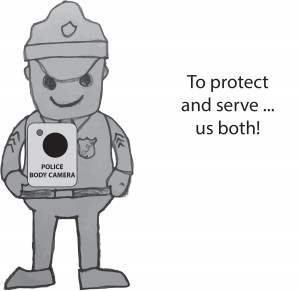Putting body cameras on police officers is a good idea. It would change police behavior, along with those they contact.
A bill filed by State Rep. Ron Reynolds, D-Missouri City, would make body cameras mandatory on all police officers when they are on duty in the public eye. Reynolds believes this will help return trust to police departments.
Body cameras are a must to make sure police officers are behaving the correct way while on duty.

Videos of police officers behaving questionably have been circulating throughout the media.
Recently, the incident in North Charleston, S.C., with an officer who shot a man eight times was brought to light from a bystander’s phone.
The officer accused the man of trying to assault him, but the video showed something completely different.
Many believe if a body camera had been worn, the situation might have played out differently.
“If that officer had a body camera, it’s very unlikely that he would have done that repulsive conduct,” Reynolds told The Dallas Morning News.
If the officer had worn a body camera, what happened would not be up for debate. The camera would have shown the full story.
If a police officer has an altercation with another person, it is better to capture the entire situation than to have it questioned later.
TCC has recently made the positive shift toward body cameras and agreed they are needed to do their job successfully.
“We’re within the first six months of having them, and I believe we are well ahead of the curve for a police department,” said Leigh Dietrich, TCC’s assistant police chief.
Many have shown their support for these actions to be made, but some are scared it violates personal privacy. It is understandable that everyone, even police, needs personal space. But in this case, giving up that space to achieve greater protection is worth it.
Those who behave correctly will have to sacrifice in order to have cameras on those who do not.
Correcting police officers’ behavior is not the only goal of wearing body cameras. It will also, hopefully, scare the people they come in contact with to make better decisions and behave differently.
These body cameras will also help police officers who are wrongly accused of acting out by showing what really happened.
Reynolds said his proposal is not an attempt to catch officers doing wrong but to ease community concerns about police brutality.
People do try to get out of their own criminal acts by putting the blame on police officers involved, and this will help keep both parties accountable.
Harris County Constable Ron Hickman agrees body cameras are needed on the job. He believes the cameras keep everyone on better behavior, according to The Dallas Morning News.
Details of how funding will be done and guidelines on the use of body cameras are still in the making.
It is safe to say when it all gets hammered out, this use of body cameras will lead us into a more safe community.


























